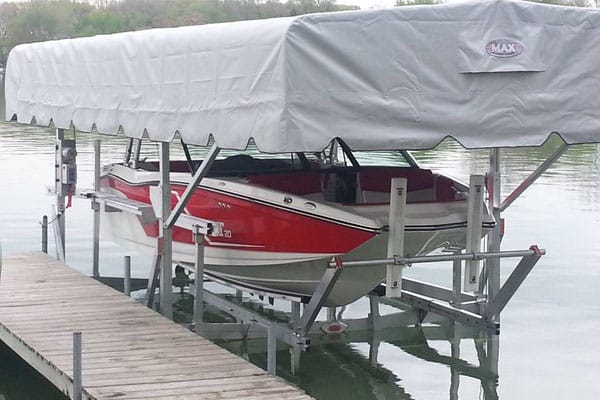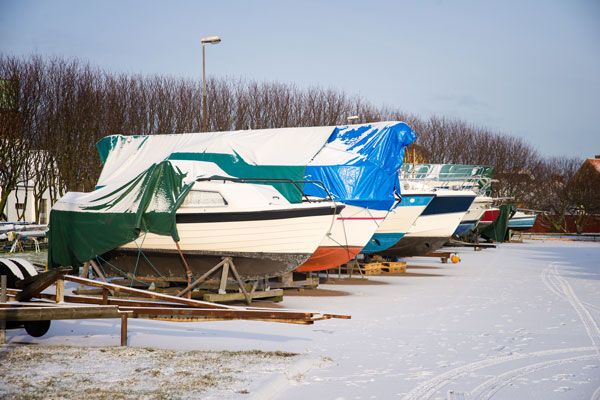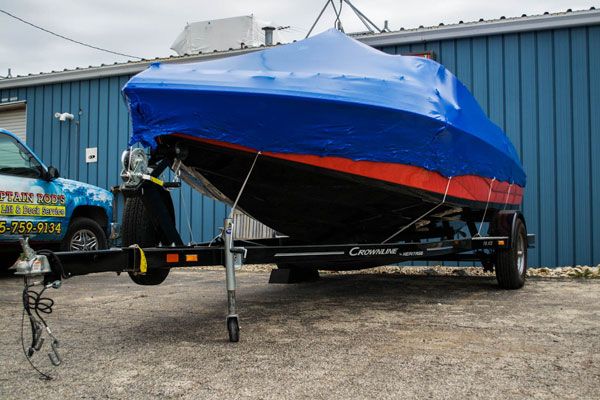Here’s everything you need to know about boat storage and winterizing, all in one place.
Here in McHenry County, where we feel the wrath of those famous Midwest winters, it’s vital to protect your boat during the off-season. One of the best ways to accomplish this is through professional boat storage and proper winterizing. But if you’re a new boat owner, then it’s possible you’re unfamiliar with the maintenance your craft needs to stay in tip-top shape. So, we’ve put together a master list of everything you need to know about winterizing your boat to make sure it’s ready for another summer of fun!
What is boat winterizing?
Winterizing is a process of routine maintenance that protects your boat against corrosion and ice damage during the colder months. More importantly, it’s the best way to increase the longevity of your craft. Investing in high-quality winterizing every season can save you thousands of dollars in repairs.
So, the long-term benefits cannot be overstated.
Proper winterizing follows a certain set of procedures for maximum protection. These procedures include:
Fuel treatment
Treating your boat’s fuel with a stabilizer will keep it fresh for long-term storage (usually up to 24 months). This will prevent you from having to waste a tank of fuel at the end of each season. Also, it guarantees quick and easy start-ups after storage. Additionally, it ensures that the carburetors and fuel injectors won’t be clogged with varnish deposits. This kind of build-up can ruin your fuel systems.
Fogging engine cylinders
At Captain Rod’s we use fogging solutions that coat the inside of the engine to protect it during the winter. When done properly, the petroleum treatment forms a thin film over the cylinders that provides necessary lubrication and corrosion resistance. This important part of the process ensures that your engine will run smoothly after it comes out of storage.
Engine Drainage
Most boat engines use surrounding water to cool the engine as it runs. If the engine isn’t drained properly, residual water in the cooling chambers can freeze, expand, and crack the engine block and manifolds. This can spell disaster for your wallet, as repairs for this kind of damage can run you $5,000-$20,000 depending on the kind of boat you have.
Oil Change
It’s important to change the oil just before storage to make sure that residual acids don’t pit bearings and other vital engine components. If not dealt with, the leftover moisture can cause undue wear, which might lead to power loss, poor mileage, and possible engine failure. Changing the oil frequently wards off internal breakdown and extends your engine’s life by years.
Where should your boat be stored?
As it gets colder, winter boat storage is also something you will have to consider. Before the lakes freeze over, you’ll have to remove your boat from the water and move it to secure location. In fact, the safest place to store your boat during the winter is out of the water and under a tight cover in a climate-controlled facility. But there are several boat storage possibilities, each with varying ranges of price, efficiency, and security. It’s up to you to decide which options works best for your situation.
Driveway Storage
If you’re on a tight budget, you might consider simply storing your boat in your driveway during the winter. This is by far the cheapest option, but by no means the best or the safest. First, some neighborhood covenants prohibit driveway storage of boats—even if you have plenty of space for them. So, before you go this route, you’ll have to check with your township to make sure you don’t incur any fines.
Another major drawback is the lack of security and exposure to pests. Any manner of rodents, insects, and other animals can wreak havoc on your boat. Furthermore, as much as you might trust your neighbors, you never know what might happen by leaving your boat so exposed. The risk just isn’t worth it.
Garage Storage
Similarly, if you have the space, you might choose to keep your boat in your home garage. This is another cost-effective option that’s slightly safer than simply keeping it in the driveway. But it still comes with its own set of cons.
For instance, your boat will take up a lot of space, which will severely limit your storage space for other things. To make room for your boat, you might need to sacrifice your parking spot and move things out. This will only be inconvenient during the winter, but it’s something to take into consideration. Furthermore, your boat might still be exposed to pests which might cause costly damage.
Professional Storage Facility
This might include dry rack storage facilities capable of housing dozens of boats at one time. There are indoor and outdoor locations where boats are stored safely out of the water on giant racks arranged by forklifts. The benefits of this option are increased security, no pests, and protection from the elements.
At Captain Rod’s, we offer secure boating storage in McHenry, IL. Our gated facility is always monitored under video surveillance to make sure your boat is protected at all times. When store your boat with us, you relax with the knowledge it will be kept safe all season long.
Shrink wrap your boat for maximum protection.
Standard boat covers offer little in the form of protection. They can easily fill with snow and ice, which may cause your boat a great deal of damage. That’s why we recommend shrink wrap to protect your boat against dirt, debris and inclement weather. Additionally, it’s your best option if you decide against storing your boat in an indoor, temperature-controlled facility.
What is shrink wrap?
Shrink wrap is a durable plastic material that shrinks when heated. This material is used to form a protective seal around boats to defend against: scratches, dust, dirt, moisture, snow, wind, UV rays, and more. It’s a fairly inexpensive and fast process that offers your boat the most protection possible against unpredictable winters.
Our partner company, Unlimited Shrinkwrap, offers expert shrink wrap services across McHenry County. They make sure that your boat is well-protected throughout the off season. But shrink wrap isn’t limited to just boats. Just about anything can be shrink wrapped from lawn furniture to lawn mowers.
Hopefully you now have a better idea of everything needed to make sure your boat is well-taken care of during the off season. While proper boat winterization might seem like a lot of work, it’s worth the investment in the long-run. Your boat is sure to thank you!
We offer boat winterization and storage in McHenry County, Illinois. If you’re looking to put your trust in a hardworking team of professionals, we would love to hear from you!



